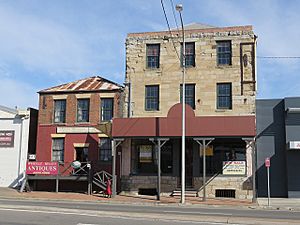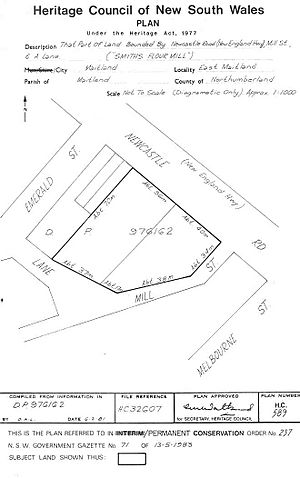Smith's Flour Mill facts for kids
Quick facts for kids Smith's Flour Mill |
|
|---|---|
 |
|
| Location | 91 Newcastle Road, East Maitland, City of Maitland, New South Wales, Australia |
| Built | 1844– |
| Owner | Frost Associates Pty Ltd; Kilaben Bay Pty Ltd |
| Official name: Smith's Flour Mill (former); Smiths Flour Mill | |
| Type | state heritage (built) |
| Designated | 2 April 1999 |
| Reference no. | 237 |
| Type | Mill (Grain) - Wheat |
| Category | Manufacturing and Processing |
| Builders | John Smith |
| Lua error in Module:Location_map at line 420: attempt to index field 'wikibase' (a nil value). | |
Smith's Flour Mill is an old building in East Maitland, Australia. It used to be a place where flour was made from grain. Today, it's a retail store. The mill was built starting in 1844 by a man named John Smith. It is now considered an important historical site and was added to the New South Wales State Heritage Register on April 2, 1999.
Contents
The Story of Smith's Flour Mill
John Smith: From Convict to Gentleman
The story of Smith's Flour Mill begins with John Smith. He was a former convict who became a wealthy landowner. Even though he had been a convict, he liked to call himself "Gentleman Smith." He was very determined to succeed in life.
In 1847, the Governor of New South Wales, Governor Fitzroy, even used Smith's carriage during a visit to the Hunter Valley. Smith might have named a road on his farm "Fitzroy Road" to honor the Governor.
Early Days in Maitland
John Smith was one of the first settlers in the Maitland area. He claimed he was the oldest settler on the Hunter River. In 1818, Governor Macquarie allowed Smith and two others to choose land in Maitland. Smith believed East Maitland was the best spot for a town.
Smith also helped people during a big flood in 1819. He said he used a large boat to rescue settlers from the roofs of their houses in West Maitland. He then took them to higher ground.
The Mill's Changing Purpose
Smith built his large steam-powered flour mill in East Maitland. However, by the 1860s, farmers in the Lower Hunter area started growing less wheat. This meant the mill wasn't making enough money anymore.
In 1868, Smith had an idea to turn the mill into a factory for making woollen cloth. But no one wanted to invest money in his plan. John Smith passed away in 1870, and his idea for a woollen factory never happened.
John Smith and his wife, Mary, are buried in Newcastle. He was an interesting pioneer who lived a long and busy life. Many old records tell us about his character and how he became a wealthy man from humble beginnings.
After Smith died, the mill building was used for different shops and businesses. By 2017, it was empty.
Why It's a Heritage Site
Smith's Flour Mill is listed on the New South Wales State Heritage Register. This means it's an important historical place that needs to be protected. It was officially added to the register on April 2, 1999.


